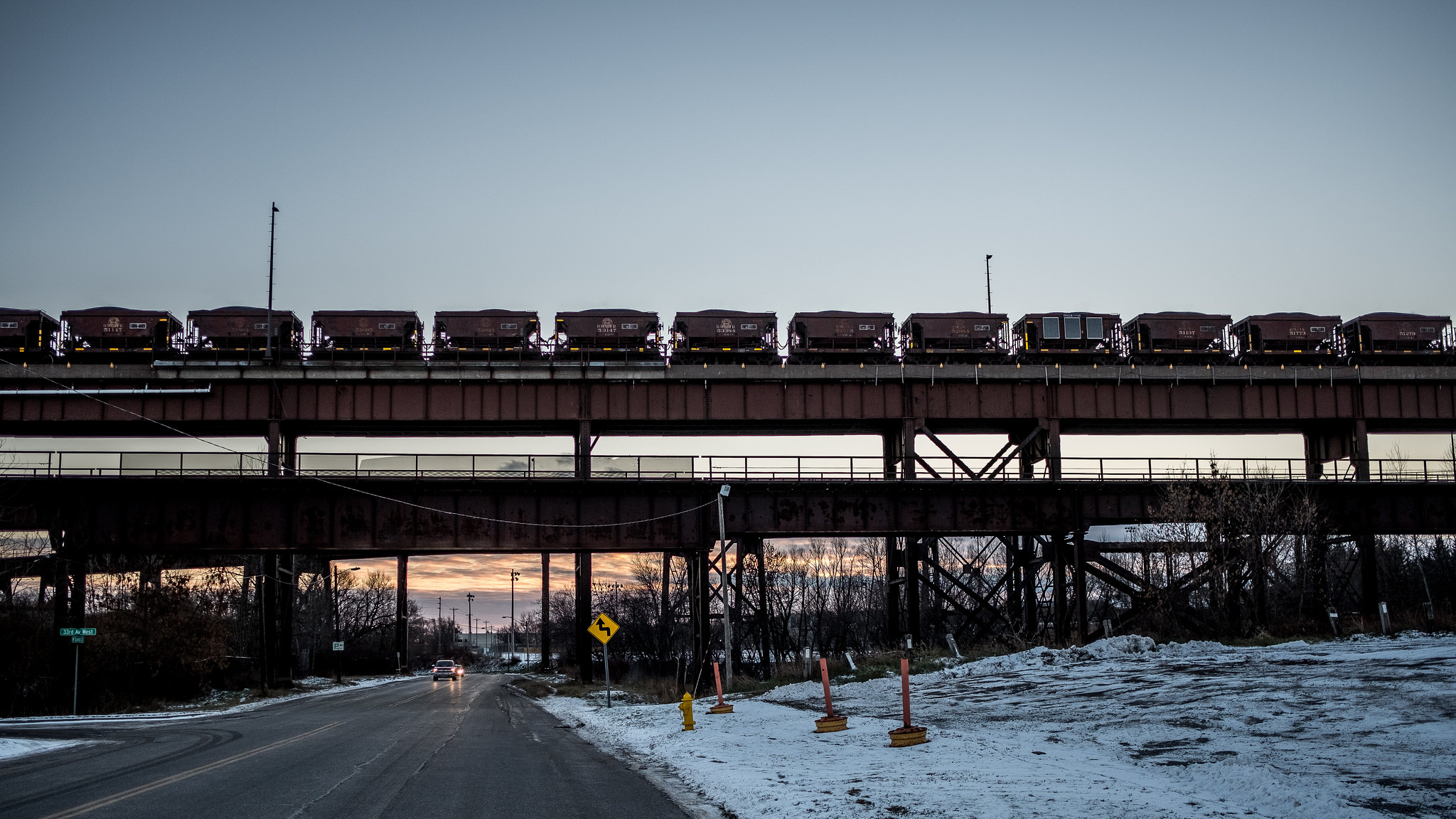For the past six months, it has been impossible to ignore the railroads.
Last fall, as 115,000 railway workers represented by 12 unions prepared to strike, figures like $2 billion were floated to demonstrate the daily economic impact of North American train transport. At the urging of President Joe Biden, the U.S. Senate voted 80 to 15 on December 1 to impose a previously rejected contract, effectively killing the rights of workers to strike.
“It’s hard to know who to be mad at…" Michael Sorman, a Twin Cities-based railway truck driver, told Racket that month. "It seems like everybody has failed us—our national division within our union failed us, the president has failed us, Congress has failed us, the railroad itself has failed us. I don’t think anybody was on our side.”
Then, on February 3, a towering dark plume of toxic fumes rose above East Palestine, Ohio. A 150-car Norfolk Southern train carrying a flammable gas—vinyl chloride—had derailed, poisoning the air, water, and soil around the 4,700-person community. “This was 100 percent preventable,” said Jennifer L. Homendy, chairwoman of the National Transportation Safety Board. Hazardous materials expert and retired fire chief Sil Caggiano shared stronger words with In These Times: “We basically nuked a town with chemicals so we could get a railroad open.”
Starting in 2005, Fosston, Minnesota's Tom Steinbrenner worked on track maintenance for Canadian Pacific Railway. He says his team was on the safety offensive in those days, tracking down buckled bars in the summer and shattered ones in the winter before they became major issues. Everything changed in 2011 with the introduction of Precision Scheduled Railroading (P.S.R.)—"a buzz term for stockholders," says Steinbrenner, who worked the railways until being elected in 2021 as the district vice general chairman of the Brotherhood of Maintenance of Way Employees
The practical effect of P.S.R., according to rail workers, has been slashed jobs, overextended shifts, and increasingly punitive punishments. Overall, safety has suffered.
"We’ve watched track integrity dwindle down to genuine concern—just deteriorate, deteriorate, deteriorate," Steinbrenner says. "And every time we speak about it, [management and rail carriers] attack us saying we just want more jobs.”
Ultimately, monopolistic rail barons dream of one day shifting to one-man conductor crews, according to labor historian Peter Rachleff. That Amazon-evoking efficiency obsession has resulted in windfalls for investors: The seven major North American railroad companies hauled in a combined $27 billion in net profits circa 2021, riches they showered on investors via hundreds of millions in stock buybacks and dividends. “I gotta say that they are maybe the worst case of corporate greed that I have seen,” Sen. Bernie Sanders observed last year.
“Everybody was telling the rail companies in 2011, when we started PSR, it’s not if we have a next derailment, it’s when," Steinbrenner says. "I’m never going to be thankful East Palestine happened, but I am thankful it’s bringing attention to derailments.”
And since the East Palestine disaster, derailments just keep making headlines. Last week a BNSF train derailed north of Seattle, spilling "as much as" 3,100 gallons of diesel on the Swinomish Reservation; closer to home, a (mercifully) short three-car train went off the tracks Sunday across from Duluth's Lake Superior Zoo; just yesterday a trash-loaded freight train derailed in rural Massachusetts. Overall, U.S. train accidents, injuries, and fatalities have trended downward since 2000, according to the the Bureau of Transportation Statistics. BTS reports an average of 1,704 derailments per year.
“It feels like, now, you’re running right on the edge of a razor," Steinbrenner says. "Every train that passes by, you’re like, ‘God, I hope if they derail, it’s not in a community.’"
Duluth's Nick Katich paints a similarly dire picture. Before becoming legislative director for his union, SMART Transportation Division MN, he worked as a train conductor for two decades, first with Canadian National and then with Canadian Pacific.
“Quite frankly, everybody should be very concerned... excuse the expression, but there’s shit out in the rhubarb just about everyday—something is on its side and on fire," he says, deploying an expression that we'll absolutely excuse. "We’re a little callous to it as rail workers, because it has become the way of the operation, but it doesn’t need to be.”
"Common sense" safety solutions have been phased out, deemphasized, or ignored, Katich says, pinch-penny moves that the rail companies make to appeal to Wall Street.
One of those is wayside tracking detectors, which can flag track problems but aren't subject to federal regulations; in the case of East Palestine, NTSB investigators believe a faulty wheel bearing didn't get hot enough to trigger a detector until it was too late. The U.S. rail industry still largely relies on Civil War-era braking technology; proposed regulations around the adoption of electronically controlled pneumatic (ECP) brakes, especially for trains carrying dangerous cargo, have so far been blocked by a "lobbying blitz," Lever News reports.
“The U.S. government shies away from the railroads, and that needs to change. It’s time to adjust the regulations and the penalties," Katich says, adding that he's not calling for the nationalization of railroads, though some rank-and-file workers are doing just that.
The heavy, corporatized hand of executives can be felt all the way down the chain. Customer service suffers because of it, as demonstrated by two “ludicrous, cockamamie” examples from Katich. Railyard “dwell time” is tightly controlled by management, and, even if a car is waiting to go to its logical destination, it will oftentimes be yanked and sent somewhere else entirely, thus slowing actual work but demonstrating that a car didn’t idle longer than mandated. Another example can be observed along snowy hills in northern Minnesota. To maintain arbitrary fuel standards, Katich says trains can stall along dicey stretches of track for hours, though they don’t have to: Crews are sometimes denied permission to fire additional engines, thus gumming up the works but allowing bosses to check certain boxes. If a conductor were to fire engines without permission? They'd lose their jobs, Katich says, noting that conductors had much more freedom in the recent past. Today's zealous adherence to efficiency, at least from a spreadsheet standpoint, is directly tied to managerial bonuses, he adds.
Talking with Katich and Steinbrenner, there's an obvious pride in their work. Both maintain it's just getting much harder—and dangerous—to perform.
“We live here. These are our homes, our neighbors, who we’re running our trains through," Katich says. "We go that extra mile to make sure we’re doing it as safely as we can, but those decisions have been taken away from railroaders in the field. They’re managed remotely now on a corporate level, with a production-bonus mindset. The whole culture is broken, and that’s been a shift over the past decade-plus.”
Correction: A previous version of this article swapped the names and titles of Katich and Steinbrenner.






